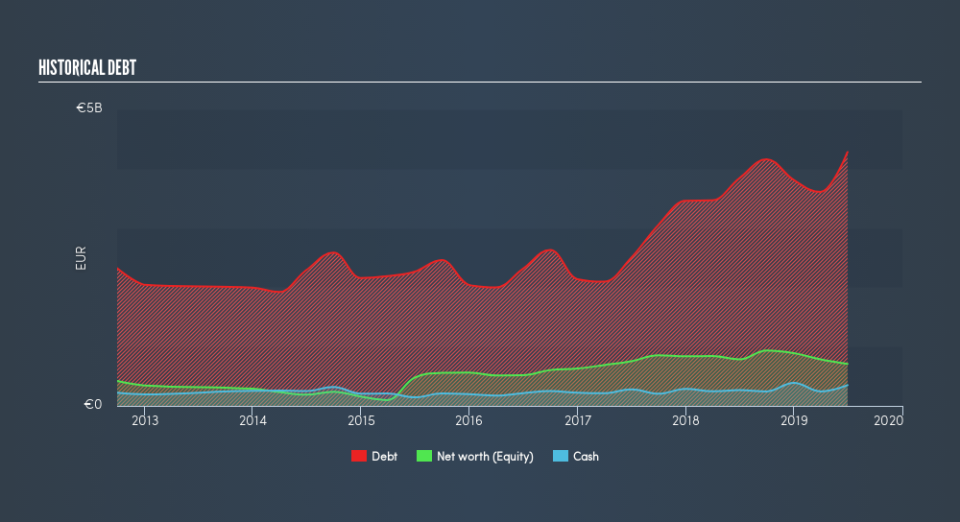Is Europcar Mobility Group (EPA:EUCAR) Using Too Much Debt?

David Iben put it well when he said, 'Volatility is not a risk we care about. What we care about is avoiding the permanent loss of capital.' So it might be obvious that you need to consider debt, when you think about how risky any given stock is, because too much debt can sink a company. We note that Europcar Mobility Group S.A. (EPA:EUCAR) does have debt on its balance sheet. But should shareholders be worried about its use of debt?
When Is Debt A Problem?
Debt and other liabilities become risky for a business when it cannot easily fulfill those obligations, either with free cash flow or by raising capital at an attractive price. Part and parcel of capitalism is the process of 'creative destruction' where failed businesses are mercilessly liquidated by their bankers. While that is not too common, we often do see indebted companies permanently diluting shareholders because lenders force them to raise capital at a distressed price. Of course, debt can be an important tool in businesses, particularly capital heavy businesses. When we think about a company's use of debt, we first look at cash and debt together.
Check out our latest analysis for Europcar Mobility Group
How Much Debt Does Europcar Mobility Group Carry?
As you can see below, at the end of June 2019, Europcar Mobility Group had €4.28b of debt, up from €3.95b a year ago. Click the image for more detail. On the flip side, it has €350.0m in cash leading to net debt of about €3.93b.
How Healthy Is Europcar Mobility Group's Balance Sheet?
We can see from the most recent balance sheet that Europcar Mobility Group had liabilities of €5.05b falling due within a year, and liabilities of €2.30b due beyond that. Offsetting these obligations, it had cash of €350.0m as well as receivables valued at €1.42b due within 12 months. So it has liabilities totalling €5.58b more than its cash and near-term receivables, combined.
This deficit casts a shadow over the €867.4m company, like a colossus towering over mere mortals. So we definitely think shareholders need to watch this one closely. At the end of the day, Europcar Mobility Group would probably need a major re-capitalization if its creditors were to demand repayment.
We use two main ratios to inform us about debt levels relative to earnings. The first is net debt divided by earnings before interest, tax, depreciation, and amortization (EBITDA), while the second is how many times its earnings before interest and tax (EBIT) covers its interest expense (or its interest cover, for short). The advantage of this approach is that we take into account both the absolute quantum of debt (with net debt to EBITDA) and the actual interest expenses associated with that debt (with its interest cover ratio).
Weak interest cover of 2.0 times and a disturbingly high net debt to EBITDA ratio of 11.3 hit our confidence in Europcar Mobility Group like a one-two punch to the gut. This means we'd consider it to have a heavy debt load. On a slightly more positive note, Europcar Mobility Group grew its EBIT at 19% over the last year, further increasing its ability to manage debt. The balance sheet is clearly the area to focus on when you are analysing debt. But it is future earnings, more than anything, that will determine Europcar Mobility Group's ability to maintain a healthy balance sheet going forward. So if you want to see what the professionals think, you might find this free report on analyst profit forecasts to be interesting.
Finally, a business needs free cash flow to pay off debt; accounting profits just don't cut it. So we clearly need to look at whether that EBIT is leading to corresponding free cash flow. During the last three years, Europcar Mobility Group burned a lot of cash. While that may be a result of expenditure for growth, it does make the debt far more risky.
Our View
On the face of it, Europcar Mobility Group's conversion of EBIT to free cash flow left us tentative about the stock, and its level of total liabilities was no more enticing than the one empty restaurant on the busiest night of the year. But on the bright side, its EBIT growth rate is a good sign, and makes us more optimistic. After considering the datapoints discussed, we think Europcar Mobility Group has too much debt. While some investors love that sort of risky play, it's certainly not our cup of tea. Over time, share prices tend to follow earnings per share, so if you're interested in Europcar Mobility Group, you may well want to click here to check an interactive graph of its earnings per share history.
Of course, if you're the type of investor who prefers buying stocks without the burden of debt, then don't hesitate to discover our exclusive list of net cash growth stocks, today.
We aim to bring you long-term focused research analysis driven by fundamental data. Note that our analysis may not factor in the latest price-sensitive company announcements or qualitative material.
If you spot an error that warrants correction, please contact the editor at editorial-team@simplywallst.com. This article by Simply Wall St is general in nature. It does not constitute a recommendation to buy or sell any stock, and does not take account of your objectives, or your financial situation. Simply Wall St has no position in the stocks mentioned. Thank you for reading.

